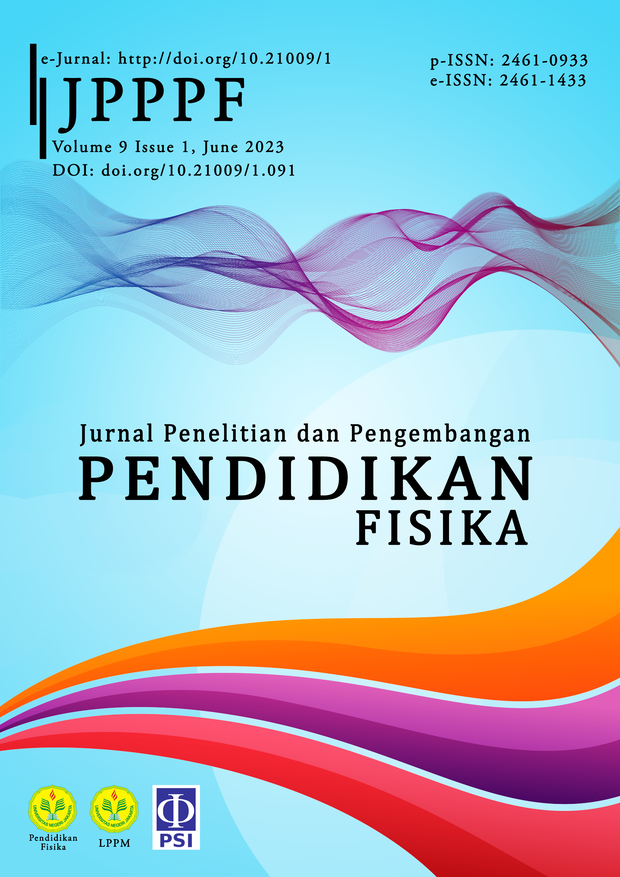Predict-Observe-Explain Learning Model Assisted by “Educandy” Games to Improve Students’ Conceptual Understanding
DOI:
https://doi.org/10.21009/1.09108Keywords:
learning model, Educandy, game, conceptual understanding, predict-observe-explainAbstract
A good understanding of concepts is needed to prevent students from misunderstanding. One effort that can be done is to apply the POE (Predict-Observe-Explain) learning model with the help of the Educandy educational game. This study aims to measure the effect of applying the POE learning model with the help of Educandy educational game application to increase students’ conceptual understanding of temperature and heat subjects. This study was quasi-experimental design research, using the nonequivalent control group design. The population of this study was 128 junior high schools students of SMPN 25 Pekanbaru (Class VII.I-Class VII.4). The first class, VII.1, was used as the experimental class, the third class, VII.3, was used as the control class, while the other class was the generalization classes. Research instrument of pretest and post-test containing 28 questions was used. The result was processed by descriptive and interferential techniques using T-test. The data processing technique used was descriptive and inferential, using the t-test for N-gain as an evaluation method. The results of this study indicated that conceptual understanding in both classes had increased, but the average value of students’ conceptual understanding in the experimental class was higher than that in the control class. It was described on the data N-gain as 0.7 in the experiment and 0.3 in the control class. The results of the t-test show that the POE learning model assisted by educational games based on the Educandy application can significantly improve students’ understanding of concepts.
References
Chandra, AN, Khairudin, M & Hertanto, DB 2017, ‘Rancang Bangun Game Edukasi Sebagai Media Pembelajaran Mata Kuliah Praktik Teknik Digital’, Jurnal Edukasi Elektro, vol. 1, no. 1, pp. 92-98, doi: 10.21831/jee.v1i1.15121.
Churches, A 2010, ‘Wiki Editting Rubric - Bloom’s Digital Taxonomy’, Educ. Origami, pp. 1-44.
Dunlosky, J, Rawson, KA, Marsh, EJ, Nathan, MJ & Willingham, DT 2013, ‘Improving students’ learning with effective learning techniques: Promising directions from cognitive and educational psychology’, Psychological Science in the Public interest, vol. 14, no. 1, pp. 4-58, doi: 10.1177/1529100612453266.
Effendi, R 2013, ‘Pengaruh Model Pembelajaran Poe (Predict-Observe- Explain) Terhadap Pemahaman Konsep Fisika Siswa Kelas X Smkn 5 Bandar Lampung Pokok Bahasan Kalor,” Jurnal Chem. Inf. Model, vol. 53, no. 9, pp. 1689-1699.
Erina Susanti, NK, Asrin, A & Khair, BN 2021, ‘Analisis Tingkat Pemahaman Konsep IPA Siswa Kelas V SDN Gugus V Kecamatan Cakranegara’, Jurnal Ilmiah Profesi Pendidikan, vol. 6, no. 4, pp. 686-690, doi: 10.29303/jipp.v6i4.317.
Fatkhurrokhman, M, Leksono, SM, Ramdani, SD & Rahman, IN 2018, ‘Learning Strategies of Productive Lesson’, J. Pendidik. Vokasi, vol. 8, no. 2, pp. 163-172.
Fitriati, I, Purnamasari, R, Fitrianingsih, N & Irawati, I 2021, ‘Implementasi Digital Game Based Learning Menggunakan Aplikasi Educandy Untuk Evaluasi Dan Motivasi Belajar Mahasiswa Bima,” in Prosiding Penelitian Dan Pengabdian, vol. 1, no. 1, pp. 307-312.
Furqani, D, Feranie, S & Winarno, N 2018, ‘The Effect of Predict-Observe-Explain (POE) Strategy on Students’ Conceptual Mastery and Critical Thinking in Learning Vibration and Wave’, Journal of science learning, vol. 2, no. 1, pp. 1-8, doi: 10.17509/jsl.v2i1.12879.
Jessani, SI 2015, ‘Science Education: Issues, Approaches and Challenges’, Journal of Education and Educational Development, vol. 2, no. 1, pp. 79-89, doi: 10.22555/joeed.v2i1.51.
Kala, N & Yaman, F 2013, ‘Technique in Probing Students ’ Understanding’, International Journal of Science and Mathematics Education, vol. 11, pp. 555-574.
Karamustafaoğlu, S & Mamlok-Naaman, R 2015, ‘Understanding electrochemistry concepts using the predict-observe-explain strategy’, Eurasia Journal of Mathematics, Science and Technology Education, vol. 11, no. 5, pp. 923-936, doi: 10.12973/eurasia.2015.1364a.
Kholfadina, MK 2022, ‘Penggunaan Educandy dan Dampaknya Terhadap Motivasi dan Hasil Belajar IPA Siswa Kelas V Sekolah Dasar’, Jurnal Penelitian dan Pengembangan Pendidikan, vol. 6, no. 2, pp. 259-265, [Online], Available: https://ejournal.undiksha.ac.id/index.php/JJL/article/download/49503/22748/134170.
Kibirige, I Osodo, J & Tlala, KM 2014, ‘The effect of predict-observe-explain strategy on learners’ misconceptions about dissolved salts’, Mediterranean Journal of Social Sciences, vol. 5, no. 4, pp. 300-310, doi: 10.5901/mjss.2014.v5n4p300.
Muharikah, A, Karnalim, O & Natsir, S 2022, ‘Hybrid Learning for A Better- Quality Education for Post- COVID-19 Learning Recovery : Indonesian Teachers ’ Perspectives’, doi: 10.55981/brin.536.c471.
Muna, IA 2017, ‘Model Pembelajaran POE (Predict-Observe-Explain) dalam Meningkatkan Pemahaman Konsep dan Keterampilan Proses IPA’, El-Wasathiya Jurnal Studi Agama, vol. 5, no. 1, pp. 73-92.
Munna, AS & Kalam, MA 2021, ‘Teaching and learning process to enhance teaching effectiveness: literature review’, International Journal of Humanities and Innovation (IJHI), vol. 4, no. 1, pp. 1-4, doi: 10.33750/ijhi.v4i1.102.
Puspitarini, YD & Hanif, M 2019, ‘Using Learning Media to Increase Learning Motivation in Elementary School’, Anatolian Journal of Education, vol. 4, no. 2, pp. 53-60, doi: 10.29333/aje.2019.426a.
Rahayu, P, Widiyatmoko, A & Hartono 2015, ‘Penerapan strategi POE (Predict-Observe-Explain) dengan metode learning journals dalam pembelajaran IPA untuk meningkatkan pemahaman konsep dan keterampilan proses sains’, Unnes Science Education Journal, vol. 4, no. 3, pp. 1014-1021.
Ratna, RM, Firdiani, D & Syarif, I 2021, ‘Penerapan Model Pembelajaran ARIAS (Assurance, Relevance, Interest, Assesment, dan Satisfaction) dapat Meningkatkan Hasil Belajar IPA Siswa Kelas Tinggi SD Negeri 138 Kulinjang’, Mahaguru Jurnal Pendidikan Guru Sekolah Dasar, vol. 2, no. 2, pp. 109-117, doi: 10.33487/mgr.v2i2.2883.
Restami, MP 2019, ‘Pengaruh Model Pembelajaran POE (PREDICT-OBSERVE-EXPLAIN) Terhadap Pemahaman Konsep Fisika Ditinjau dari Gaya Belajar Siswa’, Jurnal Pendidikan Teknologi dan Kejuruan, vol. 16, no. 1, pp. 11-20, doi: 10.23887/jptk-undiksha.v16i1.16673.
Sari, G, Hasan, M & Mahidin, M 2020, ‘The development of student worksheet based on predict observe explain to increase students’ conceptual understanding of the reaction rates’, In Journal of Physics: Conference Series, vol. 1460, no. 1, p. 012090, doi: 10.1088/1742-6596/1460/1/012090.
Ulya, M 2021, ‘Penggunaan educandy dalam evaluasi pembelajaran bahasa indonesia’, Lingua Rima: Jurnal Pendidikan Bahasa dan Sastra Indonesia, vol. 10, no. 1, pp. 55-63, [Online] Available: http://jurnal.umt.ac.id/index.php/lgrm ANALISIS.
Unicef 2021, ‘Menuju respons dan pemulihan COVID-19 yang berfokus pada anak’, Unicef.Org, pp. 1-16, [Online] Available: https://www.unicef.org/indonesia/id/laporan/menuju-respons-dan-pemulihan-covid-19-yang-berfokus-pada-anak.
Zakiyah, I, Widodo, W & Tukiran, T 2019, ‘Implementation of Predict-Observe-Explain (POE) Strategy to Reduce Misconception in Thermochemistry’, International Journal for Educational and Vocational Studies, vol. 1, no. 7, pp. 754-759, doi: 10.29103/ijevs.v1i7.1757.











